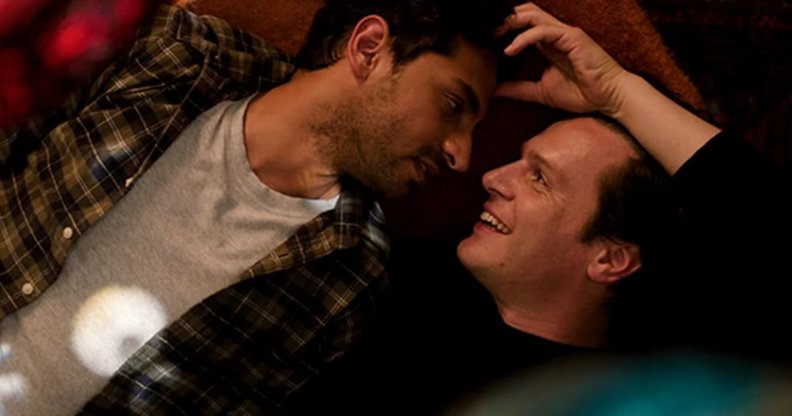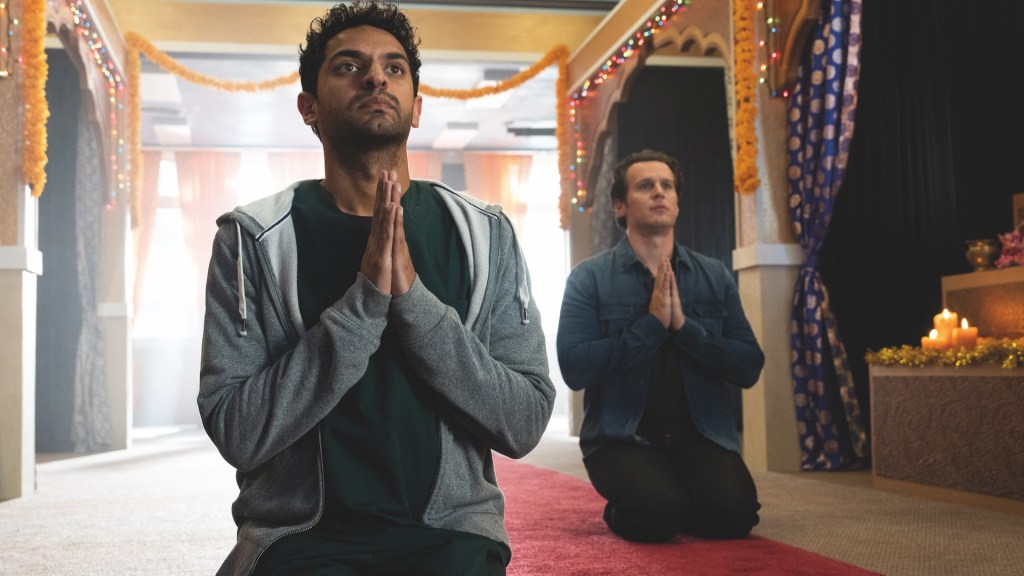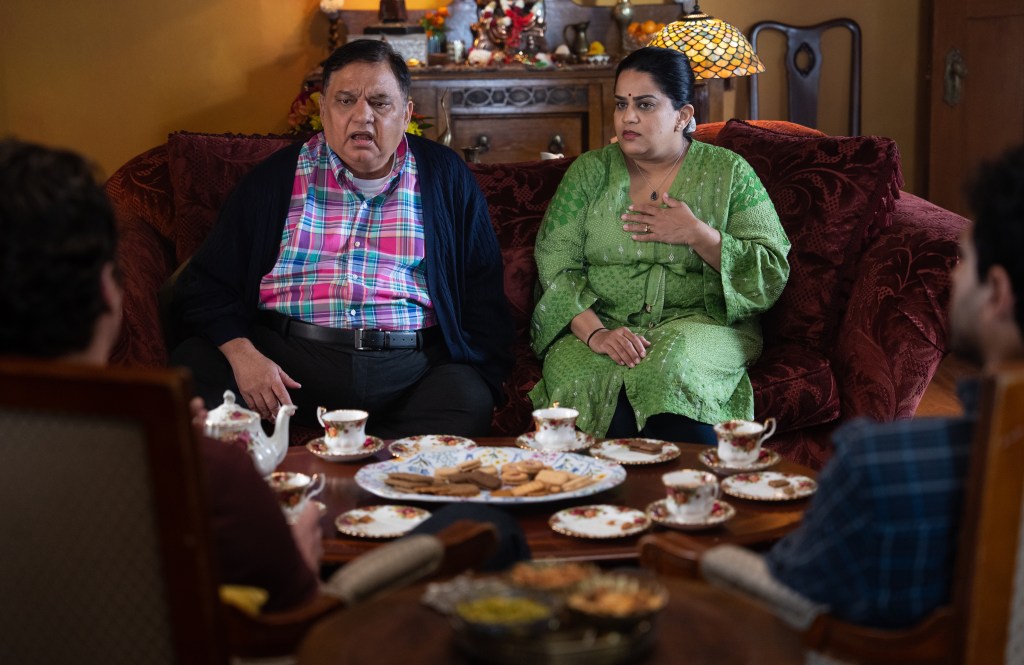A Nice Indian Boy star Jonathan Groff ‘never imagined being out would be an asset’

A Nice Indian Boy stars Karan Soni (left) and Jonathan Groff (right). (London Film Festival)
Sitting down ahead of A Nice Indian Boy’s London Film Festival premiere on 15 October, the all-gay team of 7 Days director Roshan Sethi, Deadpool’s Karan Soni and Looking’s Jonathan Groff reflect on what this South Asian, queer rom-com means to them.
A Nice Indian Boy is a thoroughly entertaining addition to the evergrowing gay rom-com canon.
The film follows lonely doctor Naveen (Soni) falling in love with white photographer Jay (Groff). He falls deep but must face the reality of introducing his partner to his parents. What follows is equal parts hilarious and touching as this sweet romance explores the nuances of queer existence in South Asian culture.
The resonance is particularly timely; the film marks the second close collaboration between Sethi and Soni, who are together in real life, following their work on 2021’s 7 Days. The film’s setting is also worth contextualising: until 2018, homosexuality was criminalised in India.
Moreover, same-sex marriage is still a topic of debate in the country.. In 2023, a push to legalise gay marriage was unanimously ruled against by the Supreme Court of India.
Against this background of Indian customs, especially the sanctity of weddings, A Nice Indian Boy establishes itself as a film wanting to celebrate equal love but willing to have fun along the way. This is quickly established on Naveen’s first date with Jay where the latter bursts into song in the middle of the street after watching DDLJ (Dilwale Dulhania Le Jayenge), a romance film that comes to mean a lot to them both.
PinkNews sat down with director Sethi and stars Soni and Groff ahead of A Nice Indian Boy’s London premiere to discuss the responsibility of representation and finding tenderness in the rom-com.

PinkNews: Roshan and Karan, you worked together previously on 7 Days. Did A Nice Indian Boy differ in the collaborative process?
Sethi: We’ve been together six years now and our approach to this movie was very similar to 7 Days. We bring different things, [Soni] is more comedy and I’m more drama, even though both of us can do the other.
Soni: For [7 Days], we were like: “Let’s test our relationship in this very stressful way.” It ended up being good couple’s therapy. Then, for [A Nice Indian Boy] we were so giddy we got to make this together because it was such a personal subject matter. If either of us made this individually, we would’ve been jealous of the other person. But we got to do it together so this one is very special.
Sethi: I don’t think I experience pure creative joy without him – it’s a deeper level of creative joy than I experienced with projects away from him. It’s a very special thing.
“I would have never imagined being out would be an asset in my career”
Groff: Oh my God, that’s so sweet. Is the joy happening when you’re actually on the set, or is it when you’re editing it?
Sethi: Both. The purest joy is watching him act. I feel like he’s acting for me when he’s being really funny.
Soni: For me, the joy is this part of it: putting the [film] out in the world. I feel so happy that we can share it because people feel moved by it. It’s so exciting to be engaged with that together.
Jonathan, your character has an interesting perspective, on paper he’s the outlier but his open-hearted nature is infectious. How was it for you to arrive with the character of Jay?
Groff: I’d never read anybody like Jay. It’s interesting to have adopted parents and grow up in a religion that you wouldn’t otherwise grow up in. I knew nothing about Indian culture, so it was a crash course. I watched the movie for the first time on Saturday, it was educational for me. I tend to be a very full-on person and I felt exposed, not in a bad way. That openness you’re talking about is part of the character but from the outside, I was like: “Oh God, Groff!” I could hold my cards a little bit closer, it was confronting to watch him be so open.
I especially loved the scene where you burst into song on the street. That set the tone.
Groff: I just did a full lip-sync to “Livin’ La Vida Loca” in the cafe at lunch with my friend today. So I am like Jay in that way, for worse or better.
Some of the most touching moments are with Naveen’s parents, these quiet scenes are so tender. How did you go about setting that tone within this comedy?
Sethi: A Nice Indian Boy was originally a play by Madhuri Shekar, it’s been put up since 2012 so those words have been tested over time. The play veers between comedy and emotion very seamlessly. The hardest thing is comedy, but everybody was so funny in this movie, which meant they could do everything.
Soni: Being a queer person, it was very cathartic to do those scenes. They were always the easiest lines to learn because it’s a feeling that has been alive, not recently but when I came out. It’s very heartfelt and intense. This movie is deceptively difficult, and for it to work so seamlessly is all on Roashan because it shouldn’t work this seamlessly.

We often discuss representation and the desire to see our reality in film. Is that a pressure you had in mind when you were bringing this story to the screen, whether that be with South Asian or queer culture?
Sethi: In general, I don’t care about representation at all. I don’t think it’s our responsibility to represent an entire community, whether that’s the queer community or the South Asian community. The burden of that is both simultaneously absurd and unachievable. If you’re writing, directing and acting [material] based on your lived experience it doesn’t matter if it’s stereotypical or the right or wrong form of representation.
In a way, all those political conversations signal to everyone else watching the movie that these movies are being performed, written and acted for people within our community when everything should be for everyone. So I try not to think about that at all.
‘In general, I don’t care about representation at all’
Soni: I wish I had this movie when I was trying to communicate with my parents. We could have watched this and it would have smoothed over a lot of things. For someone else, this could be a movie they watch with their parents and have a conversation after. That’s the limit to which I thought about it, not the broader scope of what it means for an entire community.
Groff: It feels like a door has opened. For [Sethi, Soni] and the producers it was like pushing a rock up a hill to get this movie made, it’s the definition of a passion project. In addition, I would have never imagined in 2008, when I came out, being out would be an asset in my career. I always thought it would be a hindrance. Even though there is still so much work to do, the fact I have the opportunity to be who I am, at least my sexual identity on screen, still feels like a total shock and gift.
Also, to play romance scenes with Karan was magic; getting to be romantic as two men still feels like an incredible gift. I got to experience it on the TV show Looking, which was therapeutically transformational for me. Representation continues to be such a gift as an actor.
In the film, watching romance film DDLJ (Dilwale Dulhania Le Jayenge) offers a moment of revelation for the characters. Has there been a film in your life that has had a similar lasting impact?
Sethi: For me, DDLJ is the DDLJ. What’s so fundamental about the movie is that it implies a connection between love and family; that there is no such thing as romantic love without the acceptance of the family. It links those two together in a way that is so very Indian and has influenced everything that I’ve done since.
Soni: For me, it’s another Shah Rukh Khan movie called Kal Ho Naa Ho. I used to live in India, [Kal Ho Naa Ho] came out when I was in high school and I was having a lot of suicidal ideation. I love Bollywood and the movie, to most people, is very corny. But to many people in India, it means a lot. The cheesiness is what I needed. I still watch it all the time.
Groff: Mine is Grease, I love it so much!
A great choice. Best of luck with the premiere tonight.
Soni: Thank you for your thoughtful questions.
Thank you for your thoughtful gay rom-com. I need a lesbian one next, please.
Groff: Oh! Yes!
Sethi: It’s on the list!
Soni: We need lesbian doctors.
Sethi: Yes! That’s what we need: two lesbian doctors fall in love!
A Nice Indian Boy is being screened at the London Film Festival and does not currently have a release date.
Suicide is preventable. Readers who are affected by the issues raised in this story are encouraged to contact Samaritans on 116 123 (www.samaritans.org), or Mind on 0300 123 3393 (www.mind.org.uk). Readers in the US are encouraged to contact the National Suicide Prevention Line on 1-800-273-8255.
Share your thoughts! Let us know in the comments below, and remember to keep the conversation respectful.
How did this story make you feel?

